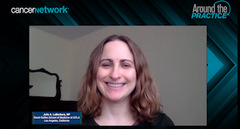
HER2+ Metastatic Breast Cancer Treatment Advances
A discussion regarding treatment advances in HER2-positive metastatic breast cancer, a heterogeneous disease.
Episodes in this series

Sara A. Hurvitz, MD: Welcome to this Cancer Network® Around the Practice presentation titled, “Multidisciplinary Management of HER2+ Breast Cancer.” I’m your host, Dr Sara Hurvitz. I’m a professor of medicine and a breast medical oncologist at the David Geffen School of Medicine at UCLA [University of California, Los Angeles]. Joining me is a group of distinguished panelists. First, Dr Kamran Ahmed. Kamran, can you introduce yourself?
Kamran Ahmed, MD: Thank you for having me. I’m Kamran Ahmed. I’m a radiation oncologist at Moffitt Cancer Center [in Tampa, Florida], and I also serve as the breast section chief of radiation oncology at Moffitt.
Sara A. Hurvitz, MD: Welcome. Thank you. Next, Julia LaBarbera, who works with me. Julia, can you introduce yourself?
Julia A. LaBarbera, NP: I’m Julia LaBarbera. I’m a nurse practitioner. I’ve been in oncology for over 15 years. I’m currently specializing in breast cancer at UCLA [Health].
Sara A. Hurvitz, MD: Welcome, Julia. Erika Rich, a patient advocate. Can you please introduce yourself?
Erika Rich: Hi, I am Erika Rich. I am a HER2 [human epidermal growth factor receptor 2]–positive patient advocate. I’ve had HER2+ breast cancer for 3 years.
Sara A. Hurvitz, MD: Welcome, and thank you for generously sharing your experience with us. Today we’re going to discuss the treatment of patients with HER2+ metastatic breast cancer with the focus on the importance of multidisciplinary care. We’ll center our discussion on a patient case, Erika’s. We’ll also briefly review recently presented data that are practice changing.
Let’s jump in and talk about breast cancer that’s HER2+. Julia, we’ve seen a lot of changes in the past few years with regard to management of HER2+ metastatic breast cancer. Before we get into those changes, can you share with us [how patients typically present when] diagnosed with HER2+ metastatic breast cancer? Of course, they come in many flavors, sizes, and ages, but what have you noticed in our practice?
Julia LaBarbera, NP: Our patients with metastatic HER2+ breast cancer tend to be younger than those who are estrogen positive and HER2-negative. Typically, these women are premenopausal. They often have higher-risk features, more extensive disease, multiple lymph nodes, and higher-grade features of their tumor. This is the opposite of how you would typically think of a patient with breast cancer.
Sara A. Hurvitz, MD: I agree completely. One thing that’s notable is that some of these patients do have hormone receptor coexpression with HER2, which gives us something else for us to target therapeutically. Studies indicated somewhere around half, maybe 60%, of patients have hormone receptor coexpression. The field has evolved a lot in terms of the management of metastatic HER2+ breast cancer. We have 8 different HER2-targeted therapies for metastatic HER2+ disease, which is a lot more than when I started in 2006, when we had only 1 HER2-targeted therapy available. In many ways, it’s made it challenging for us to understand how to best sequence these agents and choose among these different therapies, especially as we get in the second-line setting and beyond.
Transcript edited for clarity.
Newsletter
Stay up to date on recent advances in the multidisciplinary approach to cancer.





































